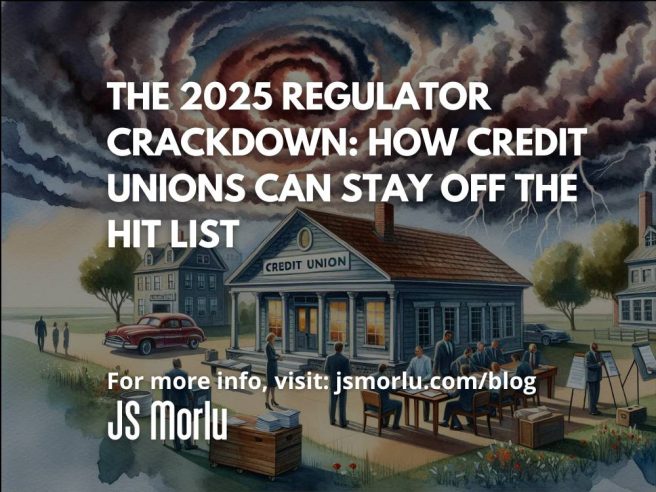Spoiler Alert: “Hoping They Don’t Notice You” Is Not a Compliance Strategy
If you think 2025 is going to be business as usual for credit union compliance, think again.
Examiners from the NCUA, state agencies, and even the CFPB are shifting into what we call “show-me-you’re-serious” mode. Gone are the days of soft extensions, guidance hand-holding, and “we’re working on it” excuses.
This year, they’re looking for action—not promises.
The Winds Have Shifted
Credit unions used to enjoy a relatively friendly relationship with regulators—collaborative exams, educational reviews, and a general spirit of cooperation.
Those days are done.
So, what changed?
- A string of high-profile credit union failures
- Embarrassing fraud and mismanagement headlines
- Political pressure to show regulatory effectiveness
Fast Fact:
In 2024 alone, the NCUA issued more cease and desist orders to small and mid-sized credit unions than in the previous three years combined.
What’s On the 2025 Regulator Hit List?
Let’s break down the main exam priorities for this year:
1. BSA/AML & OFAC Compliance
Regulators are zeroing in on:
- Transaction monitoring systems (including vendor-managed ones)
- Suspicious Activity Reports (SARs)
- Aggregation rules and red flag oversight
Real Example:
A credit union was penalized after repeatedly failing to detect multiple $9,900 cash deposits—classic structuring behavior that should’ve triggered aggregation reporting.
2. Lending & Fair Credit Practices
Expect more scrutiny around:
- Disparate impact testing
- Income verification for loans
- Documentation quality
- Lending cap adherence
💡 Interesting Tidbit:
The CFPB’s 2024 pilot review found that 30% of reviewed credit unions had “unacceptable gaps” in documenting income verification for consumer loans.
3. Cybersecurity Readiness
If you’ve been thinking “We’re too small to be a target,” regulators beg to differ.
They now expect:
- Compliance with frameworks like NIST
- Written, tested incident response plans
- Vendor cybersecurity risk assessments
True Story:
One 6,000-member CU suffered a phishing breach and paid $1.1M in remediation—partly because they lacked a written incident response policy. That failure led to a CAMEL rating downgrade.
4. Third-Party Vendor Oversight
Third-party vendors are no longer off the hook—or off your hook.
Regulators will now assess whether you’re:
- Reviewing vendor financials annually
- Requesting and analyzing SOC reports
- Maintaining up-to-date compliance certifications
The Return of Surprise Visits
Yes, unannounced regulatory visits are back—especially for credit unions that:
- Have weak internal audit programs
- Left findings unresolved
- Carry high CAMEL or risk ratings
If your compliance program hasn’t had a check-up recently, now’s the time to prepare like it’s exam day… every day.
How to Stay Off the Regulator’s Radar
This isn’t about overreacting—it’s about being proactive. Here’s what smart credit unions are doing in 2025:
✔️ Document Everything
If it’s not written, it didn’t happen. Keep detailed records of all policies, procedures, staff training, and audit trails.
✔️ Conduct Mock Exams
Bring in independent reviewers who simulate the exam process and identify gaps before regulators do.
📌 JS Morlu Tip: We help credit unions prepare for regulatory exams by simulating focus areas, identifying weak spots, and fixing issues before examiners arrive. Think of it as a compliance dress rehearsal—minus the panic.
✔️ Train Beyond the Compliance Officer
Front-line staff can cause compliance headaches if they’re unaware of basic requirements. Training should extend beyond your compliance team.
✔️ Resolve Findings Quickly
The fastest way to land on a watch list? Leaving the same issues unresolved across multiple exams. Don’t let that happen.
✔️ Audit Your Vendors
Make sure your vendors are up to regulatory standards. If they drop the ball, you’re the one who’ll be cited.
Bottom Line: Treat Compliance as a Strategic Advantage
This year’s regulatory environment isn’t about ticking boxes. It’s about demonstrating proactive stewardship of member assets.
The credit unions that thrive in 2025 won’t just be compliant—they’ll be confident. Treating compliance as a strategic differentiator, not just a defensive move, will separate leaders from laggards.
Need Help Getting Ready?
JS Morlu helps credit unions simulate examiner focus areas, uncover blind spots, and strengthen controls before regulators arrive. Whether you’re prepping for an exam or just want peace of mind, we’ve got your back.
👉 Reach out for a free consultation today.
JS Morlu LLC is a top-tier accounting firm based in Woodbridge, Virginia, with a team of highly experienced and qualified CPAs and business advisors. We are dedicated to providing comprehensive accounting, tax, and business advisory services to clients throughout the Washington, D.C. Metro Area and the surrounding regions. With over a decade of experience, we have cultivated a deep understanding of our clients’ needs and aspirations. We recognize that our clients seek more than just value-added accounting services; they seek a trusted partner who can guide them towards achieving their business goals and personal financial well-being.
Talk to us || What our clients says about us



